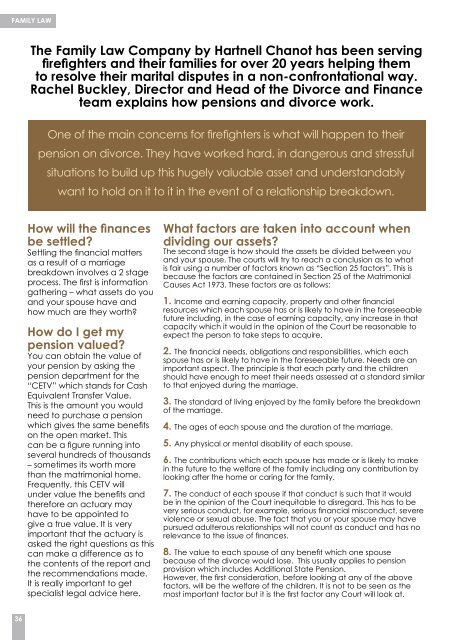Firestyle Magazine: Issue 1 - Autumn 2015
Welcome to the Firestyle Magazine – The Magazine for the 21st Century Fire and Rescue Services Personnel. Please visit our website for more: <a href="http://firestylemagazine.co.uk">http://firestylemagazine.co.uk</a>
Welcome to the Firestyle Magazine – The Magazine for the 21st Century Fire and Rescue Services Personnel. Please visit our website for more: <a href="http://firestylemagazine.co.uk">http://firestylemagazine.co.uk</a>
You also want an ePaper? Increase the reach of your titles
YUMPU automatically turns print PDFs into web optimized ePapers that Google loves.
FAMILY LAW<br />
The Family Law Company by Hartnell Chanot has been serving<br />
firefighters and their families for over 20 years helping them<br />
to resolve their marital disputes in a non-confrontational way.<br />
Rachel Buckley, Director and Head of the Divorce and Finance<br />
team explains how pensions and divorce work.<br />
One of the main concerns for firefighters is what will happen to their<br />
pension on divorce. They have worked hard, in dangerous and stressful<br />
situations to build up this hugely valuable asset and understandably<br />
want to hold on it to it in the event of a relationship breakdown.<br />
How will the finances<br />
be settled?<br />
Settling the financial matters<br />
as a result of a marriage<br />
breakdown involves a 2 stage<br />
process. The first is information<br />
gathering – what assets do you<br />
and your spouse have and<br />
how much are they worth?<br />
How do I get my<br />
pension valued?<br />
You can obtain the value of<br />
your pension by asking the<br />
pension department for the<br />
“CETV” which stands for Cash<br />
Equivalent Transfer Value.<br />
This is the amount you would<br />
need to purchase a pension<br />
which gives the same benefits<br />
on the open market. This<br />
can be a figure running into<br />
several hundreds of thousands<br />
– sometimes its worth more<br />
than the matrimonial home.<br />
Frequently, this CETV will<br />
under value the benefits and<br />
therefore an actuary may<br />
have to be appointed to<br />
give a true value. It is very<br />
important that the actuary is<br />
asked the right questions as this<br />
can make a difference as to<br />
the contents of the report and<br />
the recommendations made.<br />
It is really important to get<br />
specialist legal advice here.<br />
What factors are taken into account when<br />
dividing our assets?<br />
The second stage is how should the assets be divided between you<br />
and your spouse. The courts will try to reach a conclusion as to what<br />
is fair using a number of factors known as “Section 25 factors”. This is<br />
because the factors are contained in Section 25 of the Matrimonial<br />
Causes Act 1973. These factors are as follows:<br />
1. Income and earning capacity, property and other financial<br />
resources which each spouse has or is likely to have in the foreseeable<br />
future including, in the case of earning capacity, any increase in that<br />
capacity which it would in the opinion of the Court be reasonable to<br />
expect the person to take steps to acquire.<br />
2. The financial needs, obligations and responsibilities, which each<br />
spouse has or is likely to have in the foreseeable future. Needs are an<br />
important aspect. The principle is that each party and the children<br />
should have enough to meet their needs assessed at a standard similar<br />
to that enjoyed during the marriage.<br />
3. The standard of living enjoyed by the family before the breakdown<br />
of the marriage.<br />
4. The ages of each spouse and the duration of the marriage.<br />
5. Any physical or mental disability of each spouse.<br />
6. The contributions which each spouse has made or is likely to make<br />
in the future to the welfare of the family including any contribution by<br />
looking after the home or caring for the family.<br />
7. The conduct of each spouse if that conduct is such that it would<br />
be in the opinion of the Court inequitable to disregard. This has to be<br />
very serious conduct, for example, serious financial misconduct, severe<br />
violence or sexual abuse. The fact that you or your spouse may have<br />
pursued adulterous relationships will not count as conduct and has no<br />
relevance to the issue of finances.<br />
8. The value to each spouse of any benefit which one spouse<br />
because of the divorce would lose. This usually applies to pension<br />
provision which includes Additional State Pension.<br />
However, the first consideration, before looking at any of the above<br />
factors, will be the welfare of the children. It is not to be seen as the<br />
most important factor but it is the first factor any Court will look at.<br />
36










